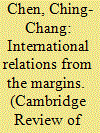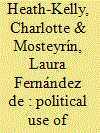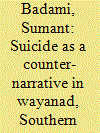| Srl | Item |
| 1 |
ID:
165783


|
|
|
|
|
| Summary/Abstract |
This article focuses on how the Lebanese government and political establishment reacted to two waves of protest movements that used slogans decrying the country's sectarian system of government. Much of the literature on Lebanon's power-sharing regime has focused on internal schisms and the challenges of mobilization against it, but little has been done to understand how it responds to anti-sectarian mobilization. I argue that the government and sectarian establishment employ co-optation, counter-narratives, and repression to demobilize protests that challenge the core pillars of sectarian representation.
|
|
|
|
|
|
|
|
|
|
|
|
|
|
|
|
| 2 |
ID:
107137


|
|
|
| 3 |
ID:
167610


|
|
|
|
|
| Summary/Abstract |
This article examines competing narratives over belonging and authority at Japan’s and China’s margins by excavating the discursive practices employed by relevant state and substate actors in framing, contesting and (dis)assembling totalizing claims over Ryukyu/Okinawa and Taiwan since the late nineteenth century. Informed by the critical international relations literature on practices of statecraft and Foucauldian conceptions of power as productive and discursive, we suggest that the aforementioned ‘margins’ are sites central to the constitution, production and maintenance of Chinese and Japanese state identities, which have been repeatedly performed through violent material and discursive practices concealing these two states’ lack of ontological foundation. We look at how the state-centric narratives employed by the Chinese and Japanese authorities have worked to limit, curtail and suppress their locally generated counter-narratives in such cases as the Taiwan Expedition (1874), the Diaoyutai/Senkaku Islands dispute and boundary-making between Okinawa and Taiwan. However, these cases also show that efforts to contain resistance to the state’s inscription of boundaries separating an ‘inside/self/domestic’ from an ‘outside/other/foreign’ cannot fully succeed, not only because where there is power there is resistance but also because the state would wither away should its identity formation be successful in the terms in which it is articulated.
|
|
|
|
|
|
|
|
|
|
|
|
|
|
|
|
| 4 |
ID:
179317


|
|
|
|
|
| Summary/Abstract |
Victims have become a topic of scholarly debate in conflict studies, especially regarding the impact of their activism on the evolution and termination of violence. Victims of terrorism are now enlisted within counter-terrorism, given their moral authority as spokespeople for counter-narratives and de-escalation. Our research explores how Spanish terrorism victims’ associations have evolved across eras of political violence and how they mediate the translation of international War on Terror discourses into Spanish counter-terrorism. We offer a topography of how the War on Terror has opened a ‘social front’ in Spanish counter-terrorism, with Spanish political elites prominently employing the victims’ associations to this end. Contemporary terrorism discourses are read back onto the memory of ETA, with victims’ associations assisting the equation of ETA with al-Qaeda and ISIS. Collective memory of the defeat of ETA has also contributed the veneer of ‘lessons learned’ to contemporary counter-terrorism measures. Our research explores the fluidity of terrorism-memory and the importation of global terrorism discourses into Spanish politics, relying upon interviews with key stakeholders in victims’ associations, local politics, and the research director of the new Victims of Terrorism Memorial Centre in Vitoria.
|
|
|
|
|
|
|
|
|
|
|
|
|
|
|
|
| 5 |
ID:
132910


|
|
|
|
|
| Publication |
2014.
|
| Summary/Abstract |
This article demonstrates how highly-politicised assessments of agrarian distress have affected professional and public perceptions of the causes of suicide, specifically in the region of Wayanad, north-eastern Kerala. Because of a bifurcation between purely sociological and purely psychological analyses of suicide, current mental health policy downplays socio-economic factors and actively promotes specifically psychiatric analyses of victims and their families. Yet, for the sake of political representation in the public sphere, sociological analyses facilitate the construction of discursive categories relating to farmer distress.
The article shows how this has meant that the struggles of certain underprivileged groups, specifically the indigenous Paniya community, are thereby rendered invisible. Moving beyond the existing dualistic approaches, field-based research findings also demonstrate the potential to see suicide as a form of communication that provides important counter-narratives to the dominant discourse about suicides in South Asia.
|
|
|
|
|
|
|
|
|
|
|
|
|
|
|
|